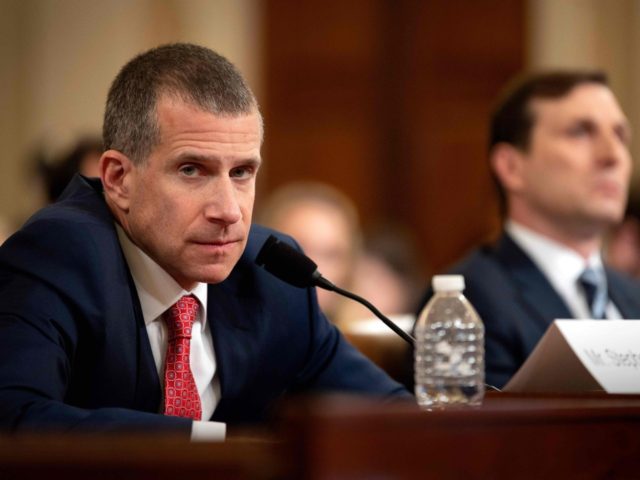Stephen Castor, Republican counsel for the House Intelligence Committee, laid out his party’s case against the impeachment of President Donald Trump in the House Judiciary Committee on Monday.
Castor was responding to the opening presentation by Democrat counsel Daniel Goldman, much of which reprised Democrats’ 300-page report, which Chairman Rep. Adam Schiff (D-CA) released last Tuesday. (Schiff himself did not appear Monday.)
Castor’s defense consisted of several key points.
First, as regards Democrats’ claim that Trump abused his power:
- There was no direct evidence of any “quid pro quo” exchanging a meeting, or U.S. aid, for investigations — just “hearsay, presumption, and speculations.”
- The best direct evidence is the transcript of the July 25th call itself, which all the witnesses agreed was substantially accurate. There was “no pressure or conditionality … no indication of bribery, extortion, or other illegal conduct.” The call never referred to the 2020 election, and never discussed the pending U.S. aid.
- Ukrainian President Volodymy Zelensky had since confirmed several times that he felt no pressure, and there had been no “quid pro quo.”
- Questions about former Vice President Joe Biden, and his son, Hunter — who was a well-paid board member of the corrupt Ukrainian gas company, Burisma — were legitimate and shared by anti-corruption activists in Ukraine itself.
- Likewise, questions about Ukrainian interference in the 2016 elections were legitimate. “Election interference is not binary,” Castor said. Just because Russia interfered in a more “systemic” way, “does not mean that some Ukrainian officials … did not work to oppose President Trump’s candidacy.”
- President Trump had a long-standing skepticism of Ukraine, particularly relating to corruption, and even U.S. diplomats admitted that Zelensky was something of an unknown quantity.
- The president also had a skepticism about U.S. foreign aid in general, and the Ukraine was no exception.
- President Trump discussed White House visits with President Zelensky several times without any preconditions.
- While U.S. Ambassador to the European Union Gordon Sondland said there had been a “quid pro quo,” his testimony was unclear: he was only referring to a White House meeting, and he had no direct knowledge of any preconditions, but “merely presumed” them. In contrast, Ambassador Kurt Volker, with direct and certain knowledge, testified that there had been no “quid pro quo” for anything.
- Sondland spoke directly to President Trump, who told him he wanted “nothing” from Ukraine and that there had been “no quid pro quo.”
- Sondland’s testimony was conflicting on several points, such as whether investigations had been raised during a July 10 meeting among Trump administration officials, or whether the meeting ended abruptly.
- Sondland acknowledged that “no one on the planet” had told him that security aid to Ukraine depended on investigations; he was merely “presuming” that there was a link.
- Other witnesses had “no first-hand knowledge” of presidential decisions or their reasons, such as a decision not to send Vice President Mike Pence to Zelensky’s inauguration, where there had been scheduling problems.
- Aid to Ukraine had been withheld before, sometimes for clear reasons and sometimes without explanation, and Ambassador Volker said the delay had not been serious.
- Witnesses agreed that President Trump’s decision to arm Ukraine with Javelin anti-Trump missiles had been a significant improvement over his predecessor’s policy. “It was President Trump, and not President Obama, who provided Ukraine with lethal defensive weapons.”
- Office of Management and Budget official Mark Sandy testified that the only reason ever given for the recent hold on Ukraine aid was that Trump wanted other countries to contribute more.
- President Trump “vehemently denied” to Sen. Ron Johnson (R-WI) on Aug. 31 that there was any link between U.S. aid and investigations, and hinted he was going to allow the aid to go through.
- The Ukrainian government did not know about the hold on aid until it was reported by Politico in an article Aug. 28, even if some Ukrainians in Washington may have suspected it. The Ukrainians never raised it before then.
- The president has an “absolute right” to recall any ambassador, and it could not possibly have been an abuse of power for him to recall Ambassador Marie Yovanovitch. He replaced her with Bill Taylor, who was hardly deferential to Trump’s policies.
- Ambassador Volker testified that the Ukrainians understood that Rudy Giuliani was not an agent of President Trump in a diplomatic sense, but a “conduit” who could “change his mind” about the country.
Second, as regards the claim about obstruction of Congress:
- The process adopted by Democrats departed significantly from the precedents in the impeachment inquiries of Richard Nixon and Bill Clinton, which ensured the president due process rights.
- Democrats denied Republican witnesses and voted down or tabled Republican subpoenas. They also directed witnesses not to ask some questions from Republicans.
Morton A. Klein is National President of the Zionist Organization of America (ZOA). A National Jewish weekly named him one of the top five Jewish leaders in America and one of the top Jew activists of the last century. Follow him on @mortonaklein7 and ZOA.org. Dr. Daniel Mandel is Director of the ZOA’ s Center for Middle East Policy and author of H.V. Evatt & the Establisment of Israel (Routledge, London, 2004).

COMMENTS
Please let us know if you're having issues with commenting.